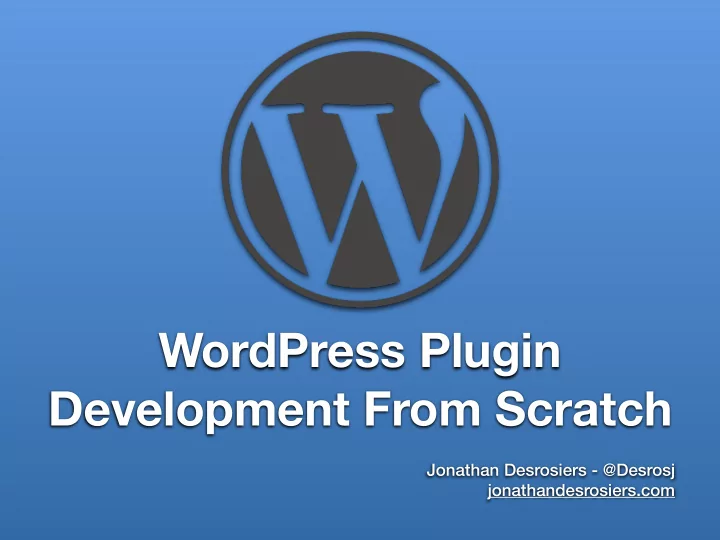

WordPress Plugin Development From Scratch Jonathan Desrosiers - @Desrosj jonathandesrosiers.com
About Me • From: Dartmouth, MA You’re Here
About Me • Senior WordPress Engineer @ Linchpin (Pawtucket, RI)
About Me • Been using WordPress about 8 years • Theme Developer • Plugin Developer • Solution Developer • Developed 2 years on the WordPress VIP platform
What’s a Plugin? A WordPress Plugin is a program, or a set of one or more functions that adds a specific set of features, or alters the default behavior of a WordPress site. Plugins reside in the wp-content/plugins folder
How Do They Work? • Action Hooks • Filter Hooks • WordPress APIs
Actions Actions are hooks that allow you to execute some code that does something. WordPress has a ton of these built in for you to use, but you can also create your own. �
Filters Filters are hooks that allow you to CHANGE something. WordPress also has a ton of these built in for you to use, but you can also create your own. �
Goals Of This Workshop • Learn how to create a plugin from scratch. • Learn how to follow WordPress best practices • Learn how to effectively use hooks • Have a good time!
Resources To Guide You • WordPress Codex: (http://codex.wordpress.org/) • WordPress PHP Coding Standards: (https://make.wordpress.org/core/handbook/coding- standards/php/)
Important Rules • Namespacing: Use a unique prefix to all of your plugin’s functions • Avoids conflicts with WordPress core functions • Avoids conflicts with other plugins
Namespacing Bad Naming Conventions
Namespacing Good Naming Conventions
WP_Debug Mode • Turn on WP_Debug mode in your wp-config.php file. • Will display errors to you on the screen for easier debugging. • Help you write better code. • NEVER enable this on production.
Never… • Develop a new plugin on a production site.
Things Needed • A playground where you can develop. • Local environment • WordPress install on your hosting account • Anywhere you don’t care about something breaking. • Code Editor • Slides & finished plugin file: jonathandesrosiers.com
Questions? • Do you need help with setting up a local environment? • Do you need help with choosing a code editor? • Do you need help with your hair? • Familiarize yourself with action and filter hook names • http://codex.wordpress.org/Plugin_API/ Action_Reference • http://codex.wordpress.org/Plugin_API/Filter_Reference
Creating Your Plugin First part of every plugin is the File Header. This helps WordPress recognize the file as a plugin, and describes itself to admins so they know what they are activating.
Adding to an Action Hook
Create A Custom Post Type WordPress comes with some core post types (posts, pages, attachments), but sometimes we have other content that should be separate. Examples: • Movies • Locations • Products • Cars
Create A Custom Post Type • Should be done within the ‘init’ action (initialization) hook.
Create A Custom Post Type • Use the register_post_type() function
Create A Custom Post Type • Use the register_post_type() function
Create A Custom Post Type
Create A Custom Taxonomy • Also Should be done within the ‘init’ action hook.
Create A Custom Taxonomy • Use register_taxonomy() function.
Create A Custom Taxonomy
Add CSS Class to Movie CPT • post_class() function outputs classes for a post. • Add to it with the ‘post_class’ filter.
Add CSS Class to Movie CPT
Add CSS Class to Movie CPT
Custom Post Meta • Metadata is data that describes other data • Use the WordPress Metadata API
Custom Post Meta - Step 1 • Register our post meta box
Custom Post Meta - Step 1 • Register our post meta box
Custom Post Meta - Step 2 • Display our post meta box.
Custom Post Meta - Step 2 • Display our post meta box.
Custom Post Meta - Step 2 • Display our post meta box.
Custom Post Meta - Step 2 • Save our post meta. • Use save_post action hook
Custom Post Meta - Step 2 • Save our post meta.
Custom Post Meta - Step 3 • Do something with the post meta. • Prepend it to our post content. • Append it to the title • Give admins the choice of where it should go
Custom Post Meta - Step 3 • Do something with the post meta - post content.
Custom Post Meta - Step 3 • Do something with the post meta - post title.
Add Custom Setting • Let’s add our custom setting • Use the ‘admin_init’ action hook.
Add Custom Setting • Let’s add our custom setting
Add Custom Setting • Let’s add our custom setting
Add Custom Setting • Let’s add our custom setting
Add Custom Setting • Use our new setting • Update our filters to only add one based on setting
Good Job! • Questions? • Twitter: @Desrosj • Slides & Finished Plugin: jonathandesrosiers.com
Recommend
More recommend